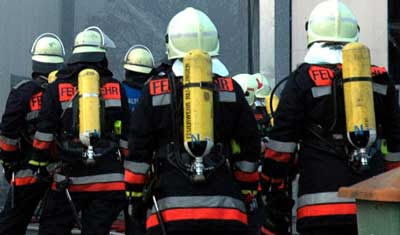Older Firefighters May Be More Resilient to Working in Heat

|
Older firefighters who are chronically exposed to heat stress on the job could be more heat resilient over time. A recent study published in the December issue of the Journal of Occupational and Environmental Hygiene (JOEH) found that older firefighters may be able to tolerate more challenging or arduous work environments before they feel affected by the heat, compared to non-heat-exposed workers who would need to stop work prematurely.
“We found that the firefighters experienced reduced subjective feelings of thermal and cardiovascular strain during exercise compared to the non-firefighters, potentially indicative of greater heat resilience in firefighters due to the nature of their occupation,” said study investigator Glen P. Kenny, PhD, a professor at the School of Human Kinetics at the University of Ottawa in Ontario, Canada.
The researchers examined a group of older, physically active non-firefighters and firefighters, approximately 51 years old, during intermittent exercise in two heat stress conditions, to investigate the potential thermal, cardiovascular and hydration effects of repeated occupational heat stress.
While Kenny and his colleagues found no differences in the level of thermal and cardiovascular strain between the older heat-exposed firefighters and non-heat-exposed older workers, the non-heat-exposed workers felt more heat stressed relative to the older firefighters and felt that the work performed was physically more challenging.
“If you have older workers who work in the heat, they are in a better position to handle working in the heat as compared to their non-heat-exposed counterparts,” said Kenny. “If they can better handle the heat stress, they can better perform challenging tasks without putting themselves at greater risks of injuries caused by impairments in mental function, alertness, concentration, motor dexterity and coordination.”
Prior to this study, physiological strain had been examined in young and middle-aged firefighters during live firefighting and simulated drills, but the responses of older and more experienced firefighters had not previously been investigated.
“Our discovery is especially important given recent findings that aging can decrease an individual’s ability to dissipate heat and therefore work in hot environments,” added Kenny.
Read the full study, which was funded by a research grant provided by the Workplace Safety and Insurance Board (Ontario).
Read an article in the October 2013 issue of The Synergist, AIHA’s magazine, about how firefighters can better protect themselves against the various hazards commonly associated with fires.
ATTRIBUTION TO THE JOURNAL OF OCCUPATIONAL AND ENVIRONMENTAL HYGIENE IS REQUESTED IN ALL NEWS COVERAGE.
# # #
JOEH is published jointly by the American Industrial Hygiene Association® (AIHA) and the American Conference of Governmental Industrial Hygienists® (ACGIH). JOEH enhances the knowledge and practice of occupational and environmental hygiene and safety. It provides a written medium for the communication of ideas, methods, processes, and research in the areas of occupational, industrial, and environmental hygiene; exposure assessment; engineering controls; occupational and environmental epidemiology, medicine, and toxicology; ergonomics; and other related disciplines.
###
Nicole Racadag, AIHA Communications
(703) 846-0700; .(JavaScript must be enabled to view this email address)
Print Version
Tell-a-Friend comments powered by Disqus





